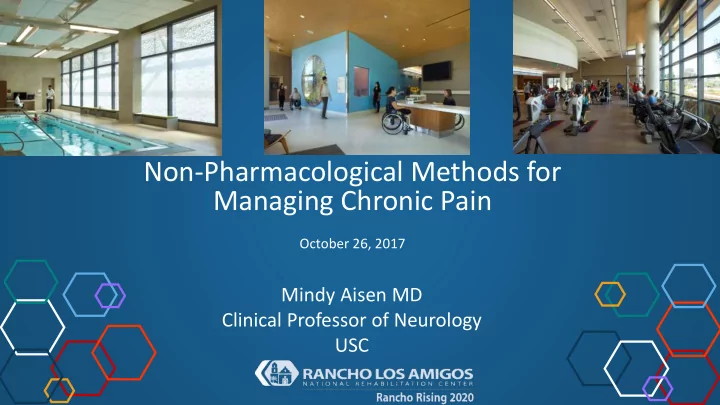

Non-Pharmacological Methods for Managing Chronic Pain October 26, 2017 Mindy Aisen MD Clinical Professor of Neurology USC
Engage and Empower the Patient Discuss symptoms and engage patient in understanding the source of their pain. • Obtain a complete history of pain location, type, etiology, prior invasive procedures related to pain • Reassure the patient that you will work with them to develop a plan to manage their pain safely. BUT this is a PARTNERSHIP. • It is important that the patient understand that everyone has pain; it is a part of life. • Not all pain can be completely eradicated.
A pain program needs to incorporate methods to 1. “distract” the patient from thinking about the pain 2. learn to “not catastrophize ” the situation 3. keep the patient physically active.
Discourage bed rest -Any activity is beneficial. If exercises are intolerable: encourage them to ‘do something’ (more to come about this…) bed rest beyond a good 8 hours sleep, is counterproductive.
Encourage activity -Yoga, stretching, strengthening the muscle groups adjacent to the pain (eg Para spinal muscles for back pain, quadriceps for knee pain) Encourage participation in Wellness Center (all DHS Hospitals have these…the local Y is another resource) 1. moving in an aquatics program (physical activity) 2. cooking, art, singing, diet, cooking classes, are some of the many immersive, pleasure producing, programs available. (distraction)
Lose weight - Musculoskeletal pain is often worsened by excess body weight stressing joints. (Weight Watchers is covered for LA Care patients)
The following techniques may also help: Cold compresses - decrease nerve conduction velocity Warm compresses- decrease spasm
Integrated Care Using The Team Approach: MD/PA/NP/Nursing Physical Therapy : focused strengthening, stretching, modalities such as ultrasound (keep moving) Occupational Therapy : can train patients in “Life style Redesign” to help them develop a program of distraction and exercise that specifically fits them. (distraction) Psychology and Social Work Counseling and Cognitive Behavior Therapy (CBT) Recreation Therapy (art, animals, gardening)
EVIDENCE? Pain coping skills training (PCST), a treatment for patients with persistent pain, has demonstrated efficacy for osteoarthritis. It teaches patients cognitive strategies and behavioral skills to reduce the effects of chronic pain on functioning and quality of life. A recent meta-analysis of psychological therapies for chronic pain documents its efficacy…. Williams AC, Eccleston C, Morley S. Psychological therapies for the management of chronic pain (excluding headache) in adults. Cochrane Database Syst Rev 2012;11:CD007407 .
Nurse practitioners can effectively deliver pain coping skills training to osteoarthritis patients with chronic pain: A randomized, controlled trial Broderick et al. PAIN 155 (2014) 1743 – 1754
Pain Coping Skills Training Workshop Hosted at USC March 22-23 2018 Open to ALL interested in learning these techniques Supported by a grant from the California Health Care Foundation
Recommend
More recommend